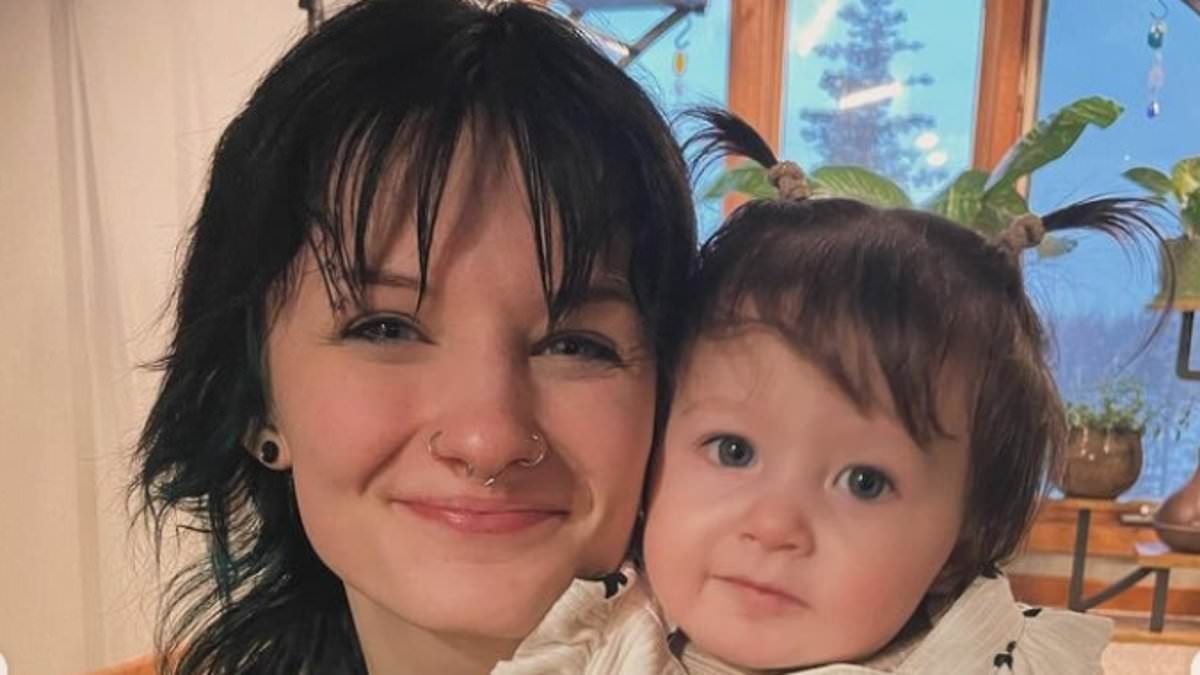Journey Richardson was in the bathtub after a hellish shift at work when her stomach ache from earlier that day suddenly began to make sense.
The Alaskan teenager, who was 17 at the time, looked down in the water between her legs and, to her astonishment, saw the top of a baby’s head.
Despite having no idea she was pregnant until that very moment, she realized she was giving birth.
Alone in the tub and frantically searching for tips on Google in between contractions, Ms Richardson birthed her daughter and, absent sterile medical equipment, had to bite off the umbilical cord herself and tie it off with a hair elastic.
The traumatic experience became nightmarish when Ms Richardson saw that her newborn was purple and not breathing.
She was forced her to administer life-saving CPR until baby Finnley took her first breaths.

Journey is pictured holding her daughter Finnley, who was born unexpectedly. Journey did not gain weight or experience any telltale signs of pregnancy, and had no idea she was expecting until the moment of delivery. (Photo courtesy of Journey’s Instagram)

Despite Journey having not had standard prenatal care and screenings, including regular visits with an obstetrician, Finnley is overall healthy with the exception of seven fused vertibrae. Photo courtesy of Journey’s Instagram
One in 2,500 women carry a baby to term without ever knowing they are pregnant, making a cryptic pregnancy about three times more common than the chance of having triplets.
A small person to start, Ms Richardson, from Anchorage, never showed signs of pregnancy.
She didn’t gain weight or experience symptoms that something else could not explain away.
Ms Richardson has a retroverted uterus, which means her uterus tilts backward toward the spine instead of forward towards the belly, so her belly didn’t grow.
A doctor falsely attributed her light, irregular periods and cramping to an ovarian cyst.
Because her pregnancy was never recognized, she never got the usual checks and scans to look for congenital defects.
As a result, Finnley was born with Klippel-Feil Syndrome, a condition in which two or more of the neck’s seven cervical vertebrae are abnormally fused.
In Finnley’s case, all seven vertebrae are fused, restricting any neck movement and leading to severe spinal and back tissue complications.
While it can’t be prevented, the condition can typically be detected on an ultrasound before birth.

Finnley faces a long road of surgeries to strengthen and support her spine. Doctors may also have to remove parts of her vertebrae to create space for the spinal cord and nerves to prevent neurological changes. (Photo courtesy of GoFundMe)
Ms Richardson said her cramps started on a Saturday night in March 2023: ‘I had dinner with my family for my mom’s birthday on Saturday night and went back to the house I was dog sitting at, took some ibuprofen and thought “it’s going to go away, it’s fine, it’s just period cramps.”‘
Her periods had never arrived on a regular schedule for much of her life, and she thought her upcoming period was causing the abdominal pain.
Women experiencing cryptic pregnancies may still have some irregular bleeding that is different from a menstrual period but is often mistaken for one.
Because pregnancy typically stops a woman’s period, she is less likely to suspect pregnancy if she is still bleeding for part of the month.
Ms Richardson went on: ‘So then I wake up like 4 am Sunday with these cramps, and they’re just getting worse, and then they go away.
‘I work 7 to 10am that morning and that shift was hell. It was so bad. I thought that my ovarian cyst had ruptured, so I went back to my house and grabbed some Epsom salts to take a bath in to relieve the pain.’
By the time she entered the bath, it was roughly noon on Sunday.
She said: ‘It keeps getting worse and worse and worse, and I was just like, this is bad. It’s at the point I’m hallucinating because of the pain. I’m screaming because of the pain.
‘I eventually end up feeling, to see if I can feel anything being wrong, and I feel her head. And that was the moment I realized what was happening when I felt her hair.’
She didn’t call 911 immediately, attributing it to shock
When Finnley was born, her skin was purple, and she wasn’t breathing. Ms Richardson, whose father is an emergency medical technician (EMT) and teaches life-saving CPR classes, knew how to get her baby’s heart pumping.
But that was only the start of her potentially deadly ordeal. The placenta — a temporary organ that forms in the uterus and connects mom and fetus — did not naturally come out of the uterus after the baby was born, which caused heavy bleeding.
Even in a state of shock and delirium, Ms Richardson knew, ‘This is not safe.’
She said: ‘I was bleeding way more than what the internet said was cool because, oh yeah, I was doing my Google searches in between contractions to figure out what the hell I was supposed to be doing.’
She knew she had to cut the umbilical cord tethering her to Finnley, but didn’t have access to a sterilized device.
‘I had no other option so I ended up having to bite it off and tied it with a hair tie, so I did the best I could in the circumstances that I had,’ she said.

When Finnley was born, Journey did not immediately call for emergency medical assistance despite having lost a lot of blood. She was nervous about her father, an EMT, finding out about the birth. Photo courtesy of Journey’s Instagram
She called a friend to help her after Finnley was born but didn’t want to call 911. Her father would find out, she said, still in her hazy state of shock.
Eventually, though, her friend did call emergency services, and the EMTs who arrived immediately recognized her.
Despite being nervous about her father’s reaction, Ms Richardson said her family has been very supportive of her and Finnley, who was born with a congenital defect.
Finnley faces a long road of surgeries to strengthen and support the spine. Doctors may also have to remove parts of her vertebrae to create space for the spinal cord and nerves to prevent neurological changes.
Cryptic pregnancies can be dangerous. A woman who doesn’t know she is pregnant won’t get the standard prenatal care, such as blood testing, ultrasounds and nutrition counseling.
She also may not know to make necessary lifestyle changes, such as abstaining from alcohol and drugs, which can be deadly for both mom and baby.
While the way Finnley came into the world was less than ideal, Ms Richardson said she wouldn’t change any of it.
She said: ‘I love Finn more than I’ve ever loved anything in my life, and I’m very grateful I had her in the way that I did because I wasn’t planning on ever having kids and I don’t think I would’ve gotten to experience this love if I didn’t have her the way that I did.’









